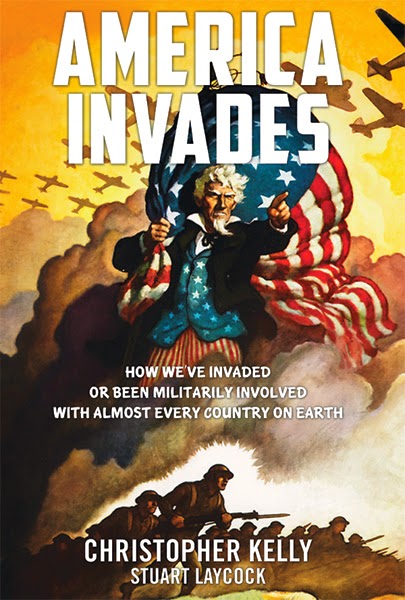 |
| Commander K. and Napoleon Hyde Park Station, London |
Before bidding a final adieu to 2013 it may be fitting to acknowledge some significant military anniversaries.
 |
| Napoleon I, Elba |
This year marks the bicentennial of the Battle of Leipzig. At this battle, also called the Battle of Nations, fought in Eastern Germany Napoleon faced armies from Austria, Russia, Prussia and Sweden. In the course of the four day affair some of Napoleon's Saxon allies actually switched to the Allied side. The disastrous campaign in Russia in 1812 had killed 370,000 of La Grande Armee with a further 200,000 captured. The recruits of 1813 were young and inexperienced soldiers. In addition, 200,000 horses had been killed in Russia devastating the French cavalry force.
 |
| Battle of Leipzig, Re-enactment 2013 |
Napoleon's decisive defeat at Leipzig, coupled with Wellington's victory at Vitoria in Spain, meant doom for Napoleon's First Empire. Napoleon would sent into exile on Elba in 1814 (http://americanconservativeinlondon.blogspot.com/2013/08/napoleon-on-elba.html).
Napoleon's defeat in 1813 was also a blow to the fledgling American Republic who were fighting the War of 1812 (http://americanconservativeinlondon.blogspot.com/2012/04/war-of-1812.html) with Britain at the time. Napoleon was the de facto ally of President Madison and his defeat at Leipzig forced the Americans to sue for peace or face a reinforced British Army redeploying from the Peninsular campaign. The War of 1812 was a highly partisan war which divided Americans on political fault lines; Britain was New England's greatest trading partner. The Governor of Massachusetts, Caleb Strong, actually tried to negotiate a separate peace for his state.
 |
| Italian Campaign |
In July of 1943, seventy years ago, Allied forces invaded Sicily beginning the Italian campaign. This was the start of a brutal slog up the length of Italy. The Mountainous terrain worked to the advantage of the Axis defenders in slowing the Allied advance up the boot of Italy. The Germans were led by "smiling" Albert Kesserling, arguably the ablest Wehrmacht commander of the war.
Rick Atkinson's work, The Day of Battle (www.amzn.com/080508861X), is a masterful history of the Italian campaign.
Profligate waste characterized the entire Italian campaign. In the initial invasion of Sicily many Americans were killed by friendly fire due to trigger happy anti-aircraft gunners in the Allied naval forces (http://americanconservativeinlondon.blogspot.com/2012/07/a-hard-lesson-from-world-war-ii-and-d.html). An Axis air raid of Allied occupied Bari resulted in the sinking of a merchant ship loaded with mustard gas. Hundreds of Italian civilians and Allied soldiers died from exposure to the poison. The ancient monastery at Monte Cassino was destroyed by Allied bombing which killed monks and civilian refugees.
Iris Origo, an Englishwoman married to an Italian count, kept a fascinating diary of the war years (http://americanconservativeinlondon.blogspot.com/2013/07/war-in-val-dorcia.html).
 |
| Sherman, Flying Heritage Collection Everett,WA |
Many of the nearly forgotten dead of World War II lie today under the shade of the cypress and the vine (http://americanconservativeinlondon.blogspot.com/2013/04/the-nearly-forgotten-dead-of-world-war.html).
 |
| "Let Freedom Reign" George W. Bush Museum, Dallas |
2013 also marks the tenth anniversary of the US-led invasion of Iraq. Partisanship continues to be the prism through which many view this recent conflict.
Those on the left tend to decry it as being an unnecessary or "dumb" war. They view it as a distraction from the Global War on terror and the war in Afghanistan. They charge that Saddam had no direct link to Al Qaeda or Osama Bin Laden. They point to the war's enormous cost in terms of lives and treasure. They point to the botched occupation and the bloody insurgency that followed the invasion. They point to the catastrophic intelligence failure of the CIA in the lead up to war and the failure to find WMD in Iraq. Some even allege that it was a mercenary war for oil.
 |
| Deluded Power, Patty Warashina |
We tend to suffer from a surprising forgetfulness or historical amnesia about even the recent past. We complain about the rhetorical brick-bats that Iran hurls at the state of Israel (Ahmadinejad: "Anybody who recognizes Israel will burn in the fire of the Islamic nation's fury."), but we seem to forget the actual SCUD missiles launched at a reluctantly neutral Israel that killed civilians in the first Gulf War in 1991. In all, 38 Iraqi missiles reached Israel, killing two and wounding 230 people (Source: http://drum.lib.umd.edu/bitstream/1903/4282/1/1993-Nature-Scud.pdf)
 |
| Commander K., 221 B Baker Street, London |
In considering the cost of the war it is also well to bear in mind the tremendous cost of NOT acting in Iraq.
1) Saddam could have used oil money to finance more terrorism and to develop its nuclear and biological capability.
2) Qaddafi's subsequent removal from Libya would have been far more costly had he retained his stocks of WMD that were disposed of in Tennessee.
3) Kuwait, Saudi Arabia, the Gulf States and Israel would all lie under immediate threat from a much more potent Iraq.
4) The world would not have witnessed the sight of a brutal dictator being toppled and put on trial by his own people.
5) The purple fingers of Iraq's experiment with representative democracy would never have helped to inspire the Arab Spring which has spread the winds of change throughout the Muslim world. Toppling Saddam in Iraq was the often unacknowledged sine qua non of the Arab spring.
Commander Kelly concludes, "War is always wasteful; it is also, however, the surest means of removing despots such as Napoleon, Hitler and Saddam Hussein. When the fires of partisanship eventually die down perhaps history will be kind to George W. Bush after all..?"
HAPPY NEW YEAR TO ALL!
* Sarin gas degrades over weeks or sometimes months. It is interesting to note that the poison satchel made for Napoleon in case of capture in the 1812 invasion of Russia merely made him wretch after he swallowed it in 1814 after his defeat in France.
You can now purchase Commander Kelly's


































